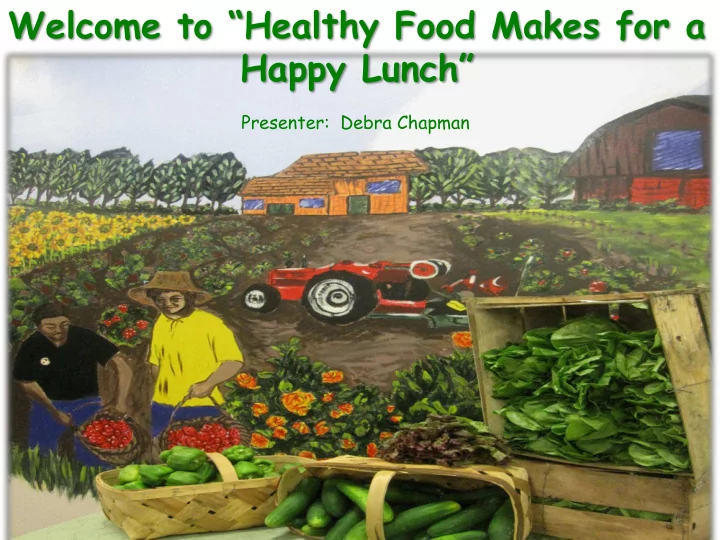

Welcome to “Healthy Food Makes for a Happy Lunch” Presenter: Debra Chapman
Purpose of Session Demonstrate how we provide students with a healthy learning environment Demonstrate how we provide students with a healthy lunch utilizing local foods
Our Mission: A Whole Child, Whole School Approach Helping children reach their full potential
Our Recipe for Every Child: Three Interconnected Ingredients Developing the Radiant Child-- Reaching Full Potential A Wise Nutrition A Healthy-High & Performance Healthy Life Styles School Building Program & Campus
Odyssey Charter School Florida’s First Healthy High Performance School Creating a National prototype for “Green” and Healthy Schools Recipient of the Governor’s 2009 Serve to Preserve “Green” School Award Fully accredited by Southern Association of Colleges and Schools (SACS) Designated a High Performing Charter School by the FL Commissioner of Education
The Healthy Facility Superior Indoor Air Quality Natural Day Lighting Energy Efficient Hospital Grade “Green” Cleaners Energy Star Rating of 95%
The Sustainable Campus Making connections with nature through: Garden Courtyards Designated National Wildlife Federation Campus Gopher Tortoise Preserve and Butterfly Garden
Wise Nutrition and Healthy Lifestyles Program Our Healthy Café serves: 80% naturally prepared, made- from- scratch wholesome foods Locally grown and seasonal produce Growth-hormone free chicken Local farm-fresh eggs and honey Fresh baked whole grain bread and whole grains No high fructose corn syrup
Nutrition Education Teachers College, Life Curriculum The Big Ideas, Center for Eco-Literacy
The Garden Integrated into the Curriculum Vermiculture Hands-on Rain Barrels Learning Composting
Developing the Radiant Child Reaching full potential holistically: Spiritually Emotionally Intellectually Physically Socially
Developing the Whole Child Through Healthy Learning Environments Montessori Hands-on Education Experiences in Nature – Place-based Environmental Education – Organic Gardening Creating the Culture for Learning – Positive Discipline in the Classroom – Conflict Resolution – Peace Education
Setting the School’s Food Compass through Food Policy “Rethinking the School Lunch Guide” – A systems approach from The Center for Ecoliteracy A well defined Wellness Policy includes: - School Based Learning Parent and Student Pledge - Experiences – Healthy Celebrations & Birthday Policy Gardening - Healthy Fundraisers - - Waste Reduction Alternatives for Food as Reward - - Physical Activity Nutrition Education - - Professional Development Environmental Health - - A Self-Assessment Rubric Fundraising Policy – Sweet Deals: School Fundraising Can Be Healthy and Profitable
Our Mission: Raising student achievement from the inside out
Healthy Options/Portions – Every Lunch a Rainbow Fresh Fruit Fresh Veggies Whole Grain
Healthy Earth + Healthy Food = Happy Children
A Healthy Future for Tomorrow’s Leaders Impacting all aspects of a student’s daily life Positively impacting their home life Far-reaching outcomes into adulthood
Ten Ways to Improve Your School Lunch Program
1. Cook from scratch delicious, nutritious, seasonal and sustainable food Fresh local fruits and veggies Eliminate processed foods/meats
2. Serve antibiotic and hormone-free milk To prevent the early onset of puberty from added hormones To reduce antibiotic accumulation To reduce sugar consumption through the elimination of chocolate and strawberry milk
3. Change Á la carte menu to healthier options Don’t be afraid to experiment Be creative Keep options light and appealing
4. Eliminate trans-fats and high fructose corn syrup Read ALL of your labels carefully Our Café does not serve chicken nuggets or French fries
5. Use Only Whole Grains Ask your supplier for whole grain items such as pasta and breads We bake homemade bread that is a blend of whole wheat and ten grain flour
6. Apply for a salad bar from Michelle Obama and Chef Ann Cooper’s “Lets Move” campaign at www.thelunchbox.org
Our Salad Bar
Self-serve encourages independence and teaches portion control
7. Experiment with new veggies, fruits and recipes Students sample new recipes monthly Students provide feedback using surveys and comment boxes Students may sample items before selecting
Keep your students involved in the decisions of which foods to eat
Xtreme Cuisine Cooking Class
8. Reformulate recipes to make them healthier Replace salt with an Herb blend Reduce sugar by replacing with applesauce Use local honey sparingly in place of sugar Activity: Making Standard Recipes Healthier
9. Examples of how we incorporate leftovers in our meals: Cooked chicken in Taquitos Cooked pasta used on salad bar as pasta salad Veggies or meats for pizza & soups Menu/Wellness Newsletter
Leftovers can be used in all aspects of your lunch
10. Start a “Farm to School” Program Visit local farmers markets to find both farmers and vendors willing to work with your school
Support Local Growers - Purchase Whole Foods We purchase our We use 50% honey from a local organic local bee farm free range eggs Local organic farms provide lettuce, cucumbers, tomatoes, and peppers
Builds Self-Reliance
In the Beginning… Lessons Learned Be patient. Start slowly. From small salad 3x weekly to full salad bar Samplings determined our menu offerings Finding nutritious recipes that kids will eat can be challenging Encourage feedback both positive and negative
Future Plans Increase number of local suppliers Offer a more diverse ethnic menu Cater to dietary restrictions Develop parent education tools
Reflections & Healthy Food Links Center for Eco-Literacy, www.ecoliteracy.org/ Teachers College, Columbia University www.lifecurriculum.info/ Chef Ann Cooper http://www.chefann.com/ Odyssey Charter School www.odysseycharterschool.com Sweet Deals: School Fundraising can be Healthy and Profitable http://www.cspinet.org/schoolfundraising. pdf Local Harvest http://www.localharvest.org/ Let’s Move http://www.letsmove.gov/
Recommend
More recommend